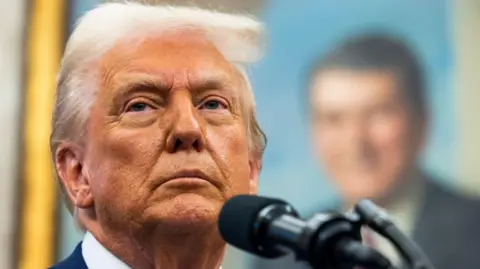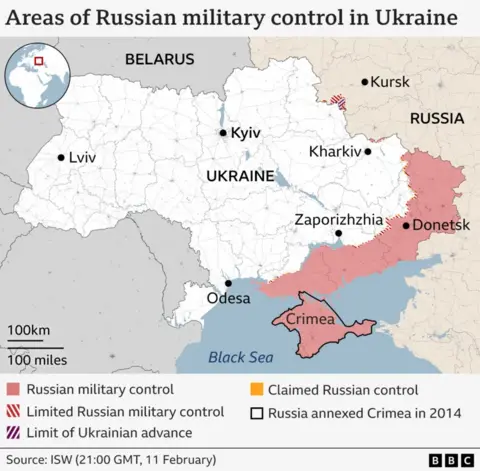BBC News
Ukraine correspondent
 EPA
EPAUS President Donald Trump has said he had a “lengthy and highly productive” phone call with Vladimir Putin on Wednesday in which the leaders agreed to begin negotiations to end the war in Ukraine.
In a post on his Truth Social platform, Trump said he and the Russian president had “agreed to have our respective teams start negotiations immediately”.
Later, Ukrainian President Volodymyr Zelensky said he had spoken with Trump about a “lasting, reliable peace”.
The calls with the warring sides came as both Trump and his defence secretary said it was unlikely Ukraine would join Nato, which will come as a bitter disappointment to Kyiv.
On Thursday, US Defence Secretary Pete Hegseth claimed Trump was the “one man in the world” capable of bringing both sides together and insisted US attempts to negotiate peace were “certainly not a betrayal” of the Ukrainian soldiers fighting invading Russian forces.
Earlier, Trump wrote on social media: “It is time to stop this ridiculous War, where there has been massive, and totally unnecessary, DEATH and DESTRUCTION. God bless the people of Russia and Ukraine!”
He did not set a date for a face-to-face meeting with Putin, but later told reporters at the White House: “We’ll meet in Saudi Arabia.”
He wrote on social media the pair had also invited each other to their respective capitals.
Zelensky said he would meet Vice-President JD Vance and Secretary of State Marco Rubio during a defence summit on Ukraine in Munich on Friday.
Kremlin spokesman Dmitry Peskov said Putin supported Trump’s idea that the time had come to work together.
The phone call between Putin and Trump lasted nearly an hour-and-a-half, during which the Russian president extended an invitation to visit Moscow, Peskov said.
Trump also told reporters at the White House that it was unlikely Ukraine would return to its pre-2014 borders but, in response to a question from the BBC, he said “some of that land will come back”.
The president said he agreed with Hegseth, who told a Nato summit earlier on Wednesday that there was no likelihood of Ukraine joining the military alliance.
Speaking to reporters ahead of the defence meeting in Brussels on Thursday, Hegseth said Russia’s invasion of Ukraine was a “factory reset” for Nato which signalled the alliance needed to be “robust”, “strong” and “real”.
Hegseth said the US had made an “incredible commitment” to Nato and reiterated calls for fellow members to increase defence spending.
He added that no country had shown a larger commitment to Ukraine than the US.
On Wednesday, seven European countries including Britain, France and Germany insisted they be part of any future negotiations on Ukraine’s fate.
“Our shared objectives should be to put Ukraine in a position of strength,” read the joint statement released after a meeting of foreign ministers in Paris.
“Ukraine and Europe must be part of any negotiations.”
They called for strong security guarantees for Ukraine and said they were looking forward to discussing the way forward with their American allies.
While it has long been known the new US administration would be less sympathetic to Ukraine than its predecessor, the words from Trump and his defence secretary will have only pleased Moscow.
Zelensky has repeatedly argued there “can be no talks on Ukraine without Ukraine” – but the Trump-Putin phone call proved otherwise.
Western help – and the Ukrainian forces who benefitted from it – are the reason Kyiv did not fall within days of Russia’s invasion, as was expected by some.
But the road to a “just peace”, as Zelensky puts it, is neither going to be straight nor smooth for Ukraine.
The Ukrainian president said his own call with Trump had been a “good and detailed discussion” about a variety of issues, and that he had also met US Treasury Secretary Scott Bessent, who is visiting Kyiv.
“No one wants peace more than Ukraine. Together with the US, we are charting our next steps to stop Russian aggression and ensure a lasting, reliable peace,” Zelensky wrote.
The Ukrainian leader added: “We agreed to maintain further contact and plan upcoming meetings.”
Ukrainian MP Kira Rudik told BBC Radio 5 Live Breakfast on Thursday she was “concerned” by Trump’s conversation with Putin because the end of the Russian leader’s “isolation” would give the “illusion” he wanted peace.
“How do we know that Putin really wants peace and wants to negotiate, and then who or what will make sure that Putin will keep his part of the bargain?” she asked.
Asked if she could conceive of Ukraine agreeing to a settlement that would concede territory to Russia, Rudik said: “We will not give up on our territories.”
“However, we may, as President Zelensky said, delay our goal to regain them.”
In an interview with The Guardian published on Tuesday, Zelensky suggested that Russian-held territory in Ukraine could be swapped for Ukrainian-held territory in Russia’s western Kursk region as part of a peace deal.
Putin’s spokesman Peskov said this was “impossible”.
“Russia has never discussed and will not discuss the exchange of its territory. Ukrainian units will be expelled from this territory. All who are not destroyed will be expelled.”
Zelensky also insisted that the US, and not just European countries, would need to be part of any security package for his country.
“Security guarantees without America are not real security guarantees,” he said.
Separately, Trump said that at “some point you’re going to have an election” in Ukraine, in what was seen as a reference to the expiry of Zelensky’s presidential term in May 2024.
Zelensky says the continuing Russian invasion and martial law in Ukraine make it impossible to hold a new presidential election.
Russia’s Putin has repeatedly questioned Zelensky’s legitimacy to hold any negotiations with Moscow.

Meanwhile, fighting between Russia and Ukraine has continued overnight.
Ukraine’s air force said there had been 140 drone attacks, starting on Wednesday evening in the Odesa and Kharkiv regions – 85 of which had been shot down.
Following the overthrow of Ukraine’s pro-Russian president in 2014, Moscow annexed the Black Sea peninsula of Crimea and backed pro-Russian separatists in bloody fighting in eastern Ukraine.
The conflict burst into all-out war when Russia invaded Ukraine nearly three years ago.
Moscow’s attempts to take control of the capital Kyiv were thwarted, but Russian forces have taken around one-fifth of Ukraine’s territory in the east and south, and have carried out air strikes across the country.
Ukraine has retaliated with artillery and drone strikes, as well as a ground offensive against Russia’s western Kursk region.
Accurate casualty counts are hard to come by due to secrecy by both the Russian and Ukrainian governments, but it is estimated that hundreds of thousands of people, most of them soldiers, have been killed or injured, and millions of Ukrainian civilians have fled as refugees.


